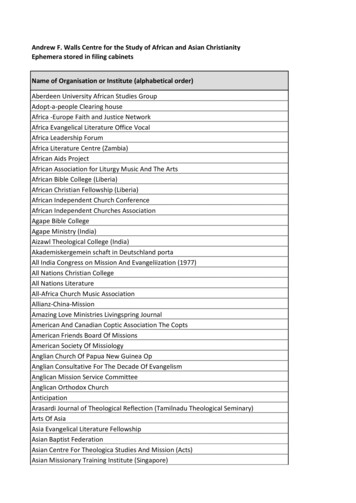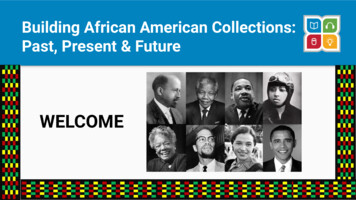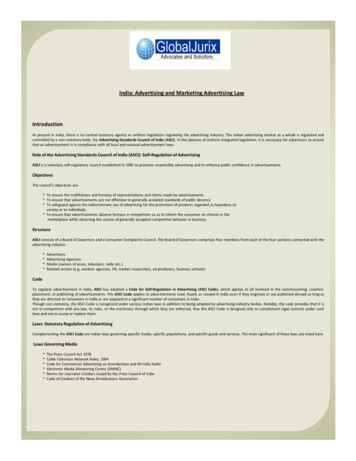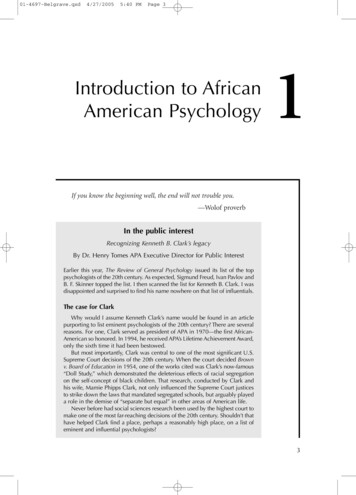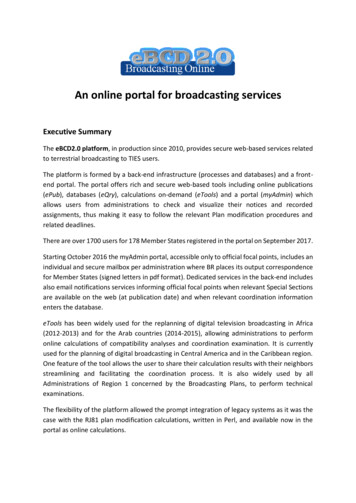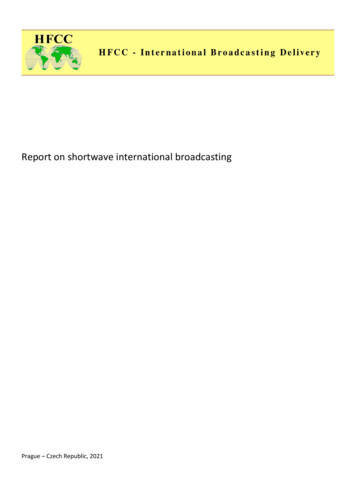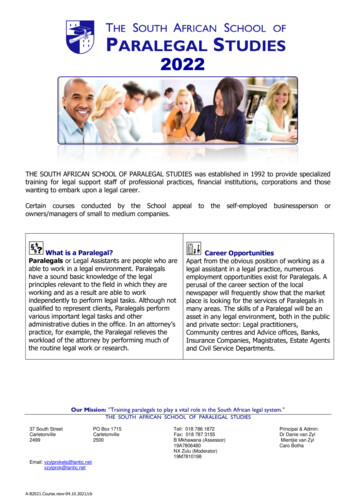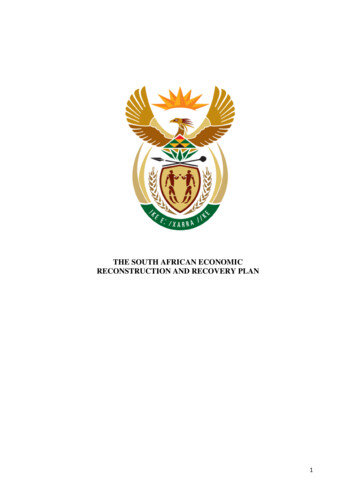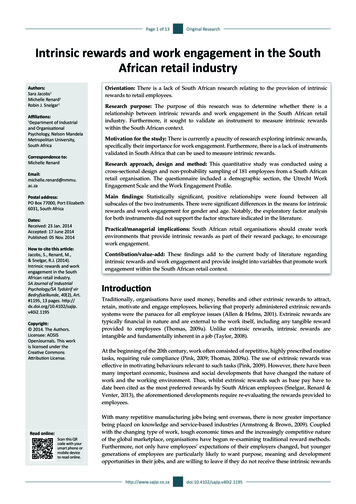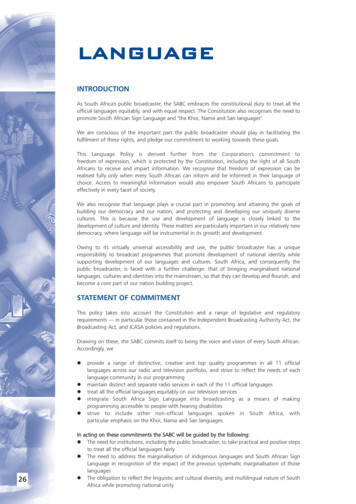
Transcription
LANGUAGEINTRODUCTIONAs South Africa's public broadcaster, the SABC embraces the constitutional duty to treat all theofficial languages equitably, and with equal respect. The Constitution also recognises the need topromote South African Sign Language and "the Khoi, Nama and San languages".We are conscious of the important part the public broadcaster should play in facilitating thefulfilment of these rights, and pledge our commitment to working towards these goals.This Language Policy is derived further from the Corporation's commitment tofreedom of expression, which is protected by the Constitution, including the right of all SouthAfricans to receive and impart information. We recognise that freedom of expression can berealised fully only when every South African can inform and be informed in their language ofchoice. Access to meaningful information would also empower South Africans to participateeffectively in every facet of society.We also recognise that language plays a crucial part in promoting and attaining the goals ofbuilding our democracy and our nation, and protecting and developing our uniquely diversecultures. This is because the use and development of language is closely linked to thedevelopment of culture and identity. These matters are particularly important in our relatively newdemocracy, where language will be instrumental in its growth and development.Owing to its virtually universal accessibility and use, the public broadcaster has a uniqueresponsibility to broadcast programmes that promote development of national identity whilesupporting development of our languages and cultures. South Africa, and consequently thepublic broadcaster, is faced with a further challenge: that of bringing marginalised nationallanguages, cultures and identities into the mainstream, so that they can develop and flourish, andbecome a core part of our nation building project.STATEMENT OF COMMITMENTThis policy takes into account the Constitution and a range of legislative and regulatoryrequirements — in particular those contained in the Independent Broadcasting Authority Act, theBroadcasting Act, and ICASA policies and regulations.Drawing on these, the SABC commits itself to being the voice and vision of every South African.Accordingly, weprovide a range of distinctive, creative and top quality programmes in all 11 officiallanguages across our radio and television portfolio, and strive to reflect the needs of eachlanguage community in our programmingmaintain distinct and separate radio services in each of the 11 official languagestreat all the official languages equitably on our television servicesintegrate South Africa Sign Language into broadcasting as a means of makingprogramming accessible to people with hearing disabilitiesstrive to include other non-official languages spoken in South Africa, withparticular emphasis on the Khoi, Nama and San languages.26In acting on these commitments the SABC will be guided by the following:The need for institutions, including the public broadcaster, to take practical and positive stepsto treat all the official languages fairlyThe need to address the marginalisation of indigenous languages and South African SignLanguage in recognition of the impact of the previous systematic marginalisation of thoselanguagesThe obligation to reflect the linguistic and cultural diversity, and multilingual nature of SouthAfrica while promoting national unity
The SABC's responsibility to be responsive to the needs of all South Africans, including thedeafThe importance of language in communication as the carrier of values, attitudes, culture andexpression.AIMS AND OBJECTIVESThe SABC's primary role is to make its programmes accessible to all the audiences, and in thatregard language is fundamental to meaningful communication. In keeping with this, the SABCaims to:Inform, educate and entertain South Africans in their home languagesPromote understanding and acceptance of and between the linguistic and cultural groups inSouth AfricaContribute to continual development of the 11 official languages and South African SignLanguagePromote multilingualism in South Africa.SCOPE OF THE POLICYThe SABC is, in terms of the Independent Broadcasting Authority Act and the Broadcasting Act,required to provide broadcasting services in all the official languages and to cater specifically forthe needs of people with hearing disabilities. Accordingly, this is an overarching policy, affectingmany activities of the Corporation.This policy should therefore be considered when the SABC:Develops strategic plans for the CorporationDevelops business plans and budgets for the CorporationFormulates programme strategies, policies and plans for each radio station and televisionchannelDetermines training needs and strategiesDevelops audience research projects to gauge the needs of viewers and listeners and to assessresponse to programmesFormulates plans for universal service and access to broadcastingInvestigates and formulates plans for the use of innovative technology.USE OF LANGUAGE IN BROADCASTINGIn fulfilling its duty to protect and nurture South Africa's official languages, the SABC strives toensure that they are all spoken correctly. In doing so the SABC commits itself to celebrating therich diversity of dialects and accents in each language group.The SABC recognises that languages are dynamic, continually developing and adapting tocircumstances; language in broadcasting should therefore take account of the evolution oflanguages.Moreover, language usage should accord with the programme genre. It is fair to assume thatmore formal language would be used in news programmes, whereas more conversational,colloquial or everyday language would be used in drama.Language in broadcasting should also take account of the social expectations and values ofdifferent language groups, and the right of every South African to be treated with respect anddignity. Language usage in broadcasting should therefore avoid giving offence and causing hurtunnecessarily. It should encourage respect and concern for everyone, and be free of elements suchas prejudice, and racist and sexist connotations. The Programming Policy and the Policy on News,Current Affairs and Information Programming expand further on this issue.27
OPERATING PRINCIPLESIn striving to play its part in reaching these common national goals, the SABC's LanguageBroadcasting Policy takes account of, and is shaped by, a number of operating principles:Use of groupings such as cognate, shared and widely understood languages so as to makethe most cost effective use of scarce resourcesSpecial action on marginalised languagesAttainment of language goals, including the use of South African Sign Language, firstly intargeted programme genresCombined use of unilingual and multilingual programmingCoverage of events of national importance to promote the development of national identity,unity and nation buildingFair allocation of resources to achieve quality in programmes on all the broadcastingplatformsApplication of appropriate technologies to achieve language coverage and access goalsUse of research to understand audiences' language broadcasting needsIntroduction of annual plans to focus implementation and monitoring of the Language PolicyDevelopment of mutually beneficial relationships with key social partners, notably the PanSouth African Language Board.These operating principles are elaborated on below.RADIORadio is still the most widely used and most accessible broadcasting medium in South Africa. Itis used in homes, cars, taxis, trains, malls and food courts. South Africans can listen to the radioall day and all night. As audiences have fragmented increasingly into niche markets there hasarisen a special responsibility for the SABC, as the public broadcaster, to offer South Africans awide range of programmes — irrespective of age, income or language. Accordingly, the SABC ischarged with providing quality radio services in all 11 official languages. In making this pledgethe SABC notes:The crucial part radio plays in the lives of many South Africans, as it is often the onlymedium available to them in their home language, and in many instances the only mediumavailable at allThe under-development of previously disadvantaged people and of their languages inSouth Africa, which must be redressed if we are to meet our commitment to deliveringexcellent radio servicesThe unique part radio can play in promoting people's right to receive information, toexpress themselves, and to inform others.The SABC further commits itself to providing quality radio programmes in non-official SouthAfrican languages, in particular in the Khoi, Nama and San languages.PROGRAMMING GUIDELINESA language service should be sensitive to and reflect the needs and lifestyles of the speakersof that language — including those of children, young people, urban and rural dwellers, andthe elderlyA language service should provide programming in genres such as news and information,children’s/educational programmes, and entertainmentProgrammes should aim to reflect the realities of the target audience, while recognising theirright to a wide range of programming from throughout South Africa and the worldProgrammes should aim to foster unity and common South Africanness.NEWS AND INFORMATION PROGRAMMES28The SABC recognises the important part news and information programmes play in enablingevery South African to participate effectively, and from an informed basis, in building ourdemocracy, nation and economy. Meaningful access to information is therefore essential, andinvolves not only reporting events, but analysing issues of significance as well.
LANGUAGEWe commit ourselves to providing comprehensive radio news and information programmes in allthe official languages.BROADCASTING EVENTS OF NATIONAL IMPORTANCEThe SABC is committed to airing events of national importance, such as the annual State of theNation Address at the Opening of Parliament, and the Budget Speech, that warrant full orextended live coverage. Coverage of these events gives South Africans access to important andrelevant information about our developing nation. On such occasions the SABC strives to ensurethat all its language services cover them. To this end, the language services collaborate with, andcomplement, one another's programmes and schedules. The Policy on News, Current Affairs andInformation Programming gives more information on broadcasting events of nationalimportance.CHILDREN’S PROGRAMMESThe Broadcasting Act requires the SABC to meet children's programming needs. Children requireinformative, educational and entertaining programmes of excellent quality, in their homelanguage, aimed specifically at addressing their needs and instilling a sense of pride in theirculture and language. These needs vary according to the circumstances and ages ofchildren, from pre-school to schoolgoing and adolescence.Radio programmes have a supportive role in nurturing and developing children's languagecapacity, and cultural knowledge and experiences. Programmes can also assist in promotingunderstanding between children of different language and cultural communities.The SABC addresses the needs of children in its language radio services by offering programmesthat cater specifically for them.The Programming Policy give more information on children's programmes.ALLOCATION OF RESOURCESThe SABC commits itself to ensuring fair allocation of financial and other resources to thelanguage services so that they can meet the requirements of broadcasting programmes ofexcellent quality.In allocating its resources, the SABC takes into account the historical imbalances between Englishand Afrikaans on one hand, and the nine African languages on the other. Moreover, the SABCtakes into account that radio, owing to people’s lower literacy levels and poverty, remains formany the only medium available for receiving essential education and information, and goodquality entertainment. Special attention is therefore paid to developing and expandingprogrammes on services that target historically disadvantaged communities.UNIVERSAL ACCESSThrough its Universal Service and Access Policy, which is described separately, the SABC ensuresthat its language services are accessible to South Africans who speak those languages.TELEVISIONThe SABC is committed to treating all the official languages equitably on television. This isachieved across the television portfolio as a whole, not on each individual channel. Over time, theSABC is committed to increasing the air-time of other official languages in local programming.Since prime time (18:00-22:00) is relatively short, the SABC is committed to considering andimplementing innovative strategies for providing programmes equitably in all the officiallanguages. One such strategy being implemented is to schedule programmes in differentlanguages on and across SABC television channels in a complementary way.29
In fulfilling its mandate to provide television programmes in all the official languages, the SABCtakes into account the following:The Constitutional requirement to treat all the official languages equitablyThe comparatively little television air time available, especially in prime time, and thecomplexities of allocating time equitably to all the languagesThe similarities and differences between the official languages; for example, certainlanguages are part of a cognate group (languages that are mutually understandable withinthat group)1 , others are not cognate but shared and understood by different communities2,whereas some are neither mutually understandable nor widely spoken3. In addition, somelanguage communities are much bigger than othersThe realisation that certain languages are recognised as being more marginalised thanothers (XiTsonga, TshiVenda, SisSwati and SiNdebele) and the additional responsibility thisplaces on institutions such as the SABC to address this marginalisationThe need to address historical underdevelopment of the vast majority of South Africans andtheir languages in order to realise the rights of all people to equality and dignityThe unique potential of television to showcase cultures and languages creatively; to nurturepeople’s knowledge and experience of one another, and to contribute to developing anational identity.GUIDELINES FOR EQUITABLE TREATMENTThe term equitable means just, fair and reasonable — not necessarily equal — treatment. Inthis regard, the SABC aims to broadcast every official language on television, while ensuringthat programmes are accessible to as many viewers as possible. We aim to complement ournational television service by providing regional services as required by the Broadcasting Act,(as amended) pending the licensing of these services by ICASA and appropriation of fundsfor this purpose, by ParliamentEquitability is achieved through a combination of means, including unilingual productionsand multilingual programmes. We strive to explore the use of technologies such as subtitlingto ensure that programmes are accessible to as many viewers as possible. At times thisobjective is met the best by broadcasting in cognate or widely understood languages. Whenthis is applied, the SABC rotates the use of languages in any cognate group in order toachieve equitability.In striving to achieve equitability, the following matters are taken into account:The overall time allocated to each languageScheduling of programmes when members of the target audiences are availableThe range of programme genres available in each languageFinancial and other resources for programmes in each of the official languages.In determining allocation of time to each language, the SABC has due regard to:The number of home language speakers in the coverage area of a channelThe geographical spread of the languageThe extent to which members of a language community are able to understand otherlanguagesThe extent of marginalisation of the languageThe extent to which it is understood by other South AfricansAvailable resources.These criteria are intended to ensure that all the languages receive some air time, but notnecessarily in equal amounts. Moreover, when these criteria are applied effectively, we dedicate agreater amount of programme time to more widely spoken or shared languages, whilecommitting ourselves to special projects for marginalised languages.30
LANGUAGETELEVISION PROGRAMMINGFor television programming, the SABC commits itself to the following principles:Across the television portfolio, the SABC aims to broadcast a range of top qualityprogrammes in each of the official languages in order to meet the information, educationand entertainment needs of audiences comprehensivelyThe SABC aims to produce and screen news and information, children's educationalprogrammes, and drama in different languages, while not neglecting other genresThe SABC aims to ensure that programmes in specific languages are broadcast at times tosuit most of the members of the target audience in that language communityThe SABC aims to broadcast programmes in the different languages that reflect the needs,lifestyles and circumstances of speakers of that language, including the children, youngpeople, urban and rural dwellers, and the elderlyScheduling of programmes across the SABC channels should be sensitive to audiences' rightto have access to a range of programmes in their home language, and in languages theyunderstand. To this end, television programmes across the channels are scheduled in acomplementary mannerProgrammes are aimed at fostering unity and a common South African identity, instead ofseparateness, and at promoting cross-cultural knowledge, appreciation and understanding.We believe our country's diverse language groups and regions should be reflected to thenation and to themselvesThe SABC creatively combines unilingual and multilingual programmes, and usesbroadcasting technologies such as subtitling, to reach its language goals.UNILINGUAL PROGRAMMESThe SABC ensures that accross the television portfolio some programmes are dedicated to eachofficial language. A programme would be classified as being in an official language if most of theprogramme were in that language.MULTILINGUAL PROGRAMMESThe SABC is conscious of the part multilingual programmes can play in promoting knowledge andunderstanding of the country's diversity of languages and cultures. Such programmes, when usedcreatively, also reach out to wider audiences.Accordingly, the SABC actively encourages production of meaningful multilingualprogrammes as a means of attaining its language broadcasting objectives. Multilingualprogrammes are those that include substantial amounts of more than one official language.TELEVISION NEWS, CURRENT AFFAIRS AND INFORMATION PROGRAMMESThe SABC is specifically obligated to provide comprehensive news and information programmes.As stated previously, meaningful access to information involves not only reporting on events, butproviding substantial analysis of issues surrounding such events. Accordingly, the followingprinciples are applied to all the SABC news, current affairs and information programmes ontelevision:The SABC screens television news bulletins in all the official languages, and is sensitive toaudience availability in scheduling news programmesGiven the constraints of channel air time, the SABC makes use of cognate languages, on arotational basis, and widely understood languages to meet this mandateThe SABC ensures that information programmes, including current affairs anddocumentaries, serve the needs of different language communities. In meeting thiscommitment, the SABC takes due cognisance of the fact that several languages are cognateto each other, or widely understood.31
BROADCASTING EVENTS OF NATIONAL IMPORTANCEThe SABC is committed to broadcasting events of national importance that warrant full orextended live coverage, such as the annual State of the Nation address by the President at theopening of Parliament, and the Budget speech.When such events are televised, the SABC strives to ensure that the broadcasts are accessible tothe widest range of South African language communities. This can be achieved through use of acombination of cognate languages and widely understood languages, and innovative use ofbroadcasting technology such as multiple soundtracks, subtitling, and Sign language. In thisregard, the SABC strives to broadcast events of national importance in the six language groups asprovided for in the National Language Policy Framework, developed by the Department of Artsand Culture. The Policy on News, Current Affairs and Information Policy gives more informationon broadcasting events of national importance.CHILDREN'S PROGRAMMESChildren require informative, educational and entertaining programming of excellent quality, intheir home language, that is aimed specifically at addressing their needs and instilling a sense ofpride in their culture and language. These needs vary according to the circumstances and ages ofchildren, from pre-school to schoolgoing and adolescence. The SABC recognises that manychildren, particularly pre-school children, understand only their home language.The SABC aims to broadcast a range of top quality educational, informative and entertainingtelevision programmes for children of different age groups that are responsive to theirlanguage needs. This can be accomplished by means such as dubbing, multilingual programmingand subtitling that is age appropriate. When acquiring and broadcasting children's programmesthe SABC takes children's language requirements into account. More information on children'sprogrammes is detailed in the Programming Policy.DRAMADrama provides a unique means of telling our South African stories, and learning from and aboutone another. The SABC broadcasts top quality South African television dramas that incombination include and reflect South African languages and cultures. We also undertake toinvestigate innovative and creative ways of ensuring that such dramas are accessible to as widea range of audiences as possible, such as multilingual productions, subtitling, and dubbing.MEETING THE NEEDS OF THE DEAF AND HARD OF HEARING, AND THE BLINDThe SABC is committed to responding to the broadcasting needs of all its audiences. Respondingeffectively to the needs of people with disabilities is an important part of our mandate. The SABCdevelops specific plans to facilitate access to its broadcasts for people with disabilities.Broadcasting of programmes in South African Sign Language, as a recognised South Africanlanguage, is one of the means of meeting the needs of people with hearing disabilities. While thebroadcasting of Sign Language interpretation facilitates access to programming by the deaf andhard of hearing, it also creates knowledge and understanding of South Africa's substantial deafand hard of hearing community, and so contributes to nation building.The SABC progressively expands the amount of programming that is signed, beginning withselected news and current affairs, and events of national importance. Special efforts are beingmade to provide Sign Language interpretation when programmes are recorded in front of liveaudiences. Such efforts facilitate participation by people from the deaf and hard of hearingcommunities in such programmes.32While focusing on providing programming that is signed, the SABC also acknowledges that aholistic approach is needed to address the needs of the deaf community. In this regard, closedcaptioning may offer a viable solution. The SABC will continue to explore various technologyoptions which may assist in providing a holistic approach in addressing the needs of the deafcommunity.
LANGUAGEIn meeting the broadcasting needs of South Africa's blind communities, the SABC undertakes toinvestigate the use of innovative technologies such as audio-description.ALLOCATION OF RESOURCESThe SABC acknowledges that it is faced with limited air time and other broadcasting resources.In order to achieve its language broadcasting objectives, the SABC undertakes to achieve fair andequitable allocation of financial and other resources when commissioning and airing programmesin the official languages.UNIVERSAL SERVICE AND ACCESSThe Broadcasting Act requires that, as circumstances permit, a range of programmes in SouthAfrica's official languages should be extended to all South Africans. The SABC undertakes topursue this objective with regard to television, through its Universal Service and Access Policy.RESEARCHThe needs and demographics of our language communities are changing andevolving continually. Since the SABC is committed to serving the broadcasting needs of thesecommunities, it undertakes to research these needs regularly, and to ensure that such researchinforms its programming and scheduling strategies. The SABC also makes use of research toassess whether the strategies and innovations it implements meet audience expectationsadequately.TECHNOLOGYThe SABC recognises that technology offers innovative means of meeting the challenges ofbroadcasting in the country's official languages and South African Sign Language. The SABCtherefore commits itself to undertaking relevant research into the creative use of technologies tofacilitate implementation of its mandate.RELATIONSHIPS WITH OTHER ORGANISATIONSThe SABC recognises that it has a significant part to play in contributing to equitable treatmentof all the official languages and South African Sign Language. It believes it can fulfill itsresponsibilities effectively in collaboration with other organisations that have also beenestablished to further these aims, such as the Pan South African Language Board. The SABCtherefore establishes mutually beneficial working relationships with such organisations tofacilitate compliance with the Language Policy outlined in this document.MONITORING AND IMPLEMENTATIONThis Language Policy lies at the core of our public service mandate as the public broadcastingservice in South Africa. In order to ensure its implementation, the Board andmanagement of the SABC have established specific appraisal and monitoring processes. TheBoard requires management to submit an annual language action plan thatidentifies future goals arising from this policy. A summary of achievements of the previous year isalso to be attached to the language action plan in order to facilitate a review of the achievements,opportunities and challenges.The summary includes the following:An account of the performance on language, including South African Sign Language, in theprevious yearA summary of the findings of any relevant research33
A summary of professional developmental programmes undertaken to meet thecompetence and skills needs of implementing this policyA summary of investigations into the use of technology, and application of technologies toimplement this language policy.The SABC also undertakes to publish relevant parts of this information as part of the Corporation’sAnnual Report to Parliament.REVIEWThis policy is reviewed by the SABC Board every five years.1Nguniand Sesotho languages are recognised as being cognate languagesexample English and Afrikaans are not cognate but home language speakers ofone often understand the other. In addition, these languages are understood bymembers of other language communities.3For example, XiTsonga and TshiVenda2For34
circumstances; language in broadcasting should therefore take account of the evolution of languages. Moreover, language usage should accord with the programme genre. It is fair to assume that . SABC is committed to increasing the air-time of other official languages in local programming. Since prime time (18:00-22:00) is relatively short, the .
